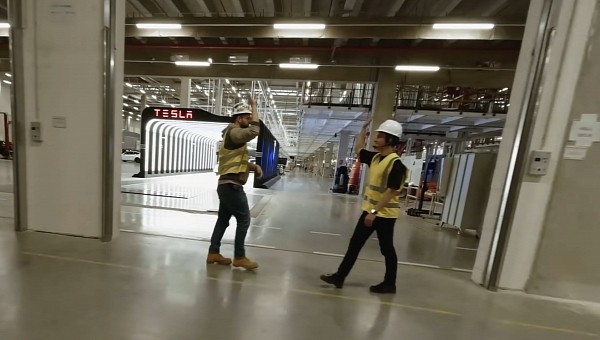Gigafactory Berlin remains a sore spot in Tesla’s otherwise impressive operations. The production ramp-up is not going to plan, as the plant lags behind other Tesla factories. One of the reasons is Tesla’s difficulties in recruiting staff in a highly competitive German labor market.
Tesla’s Gigafactory Berlin grappled with headwinds even before the construction workers broke ground. The environmentalist organizations opposed the factory, citing deforestation and water supply issues. Protests pushed the plant opening way past its due date, although Tesla eventually addressed all concerns and finally opened the production lines in Gruenheide. But even so, production ramp-up is slower than at other Tesla gigafactories, including the recently opened Giga Texas.
Tesla targeted a weekly production of 5,000 vehicles by the end of 2022, but as of October, the pace has only reached 2,000 units per week. It will be higher than that by year’s end, but still far from the projected numbers and the company’s other gigafactories. According to Tesla data tracker Troy Teslike, Giga Shanghai reached a 20,000-unit production after 100 days, and Giga Texas achieved the same feat in 151 days. In the case of Giga Berlin, this happened after 187 days.
Beyond the initial delays, one of the reasons for this appalling performance is the lack of personnel, which has prevented the deployment of a third shift. The shift was supposed to be implemented in September, but it has been pushed back. Tesla is finding it difficult to recruit enough workers at Gigafactory Berlin, mainly because it pays significantly less than the industry average in Germany and the work conditions are less encouraging. This has also led to a high turnover at the plant.
To get to the planned 5,000-unit production pace, Tesla needed 12,000 workers, but it has hired only around 7,000 by now. Also, the American EV maker is bleeding experienced personnel to other companies, according to former and current employees at the gigafactory who spoke to Wired. Current staffers are leaving jobs in drove due to low and unequal pay as well as inexperienced management in the highly competitive German manufacturing sector. One current employee, speaking under condition of anonymity out of fear of losing their job, described the situation as “total chaos.”
“Some people are off sick longer than they’ve actually worked,” they said to Wired. “There are people whom I haven’t seen working for three weeks in six months. Many people are signed off sick because the motivation isn’t there.”
Local labor specialists consulted by Wired confirmed the situation and said it is unlikely Tesla will be able to find more qualified workers to fill the gap. Tesla has got an image of an unattractive employer in the heavily unionized German automotive sector. To worsen the situation, Tesla has to compete with Volkswagen for skilled workers in the Berlin area. According to the German union IG Metall, Tesla pays 20% less than similar businesses based on staff contracts and job descriptions.
In June, a survey showed that Tesla dropped from being the second-most preferred employer for engineering graduates in Germany to sixth. Tesla fares worse than other German carmakers now, and some respondents indicated that Musk’s comments about firing employees who wanted to work from home were an important reason.
Tesla targeted a weekly production of 5,000 vehicles by the end of 2022, but as of October, the pace has only reached 2,000 units per week. It will be higher than that by year’s end, but still far from the projected numbers and the company’s other gigafactories. According to Tesla data tracker Troy Teslike, Giga Shanghai reached a 20,000-unit production after 100 days, and Giga Texas achieved the same feat in 151 days. In the case of Giga Berlin, this happened after 187 days.
Beyond the initial delays, one of the reasons for this appalling performance is the lack of personnel, which has prevented the deployment of a third shift. The shift was supposed to be implemented in September, but it has been pushed back. Tesla is finding it difficult to recruit enough workers at Gigafactory Berlin, mainly because it pays significantly less than the industry average in Germany and the work conditions are less encouraging. This has also led to a high turnover at the plant.
To get to the planned 5,000-unit production pace, Tesla needed 12,000 workers, but it has hired only around 7,000 by now. Also, the American EV maker is bleeding experienced personnel to other companies, according to former and current employees at the gigafactory who spoke to Wired. Current staffers are leaving jobs in drove due to low and unequal pay as well as inexperienced management in the highly competitive German manufacturing sector. One current employee, speaking under condition of anonymity out of fear of losing their job, described the situation as “total chaos.”
“Some people are off sick longer than they’ve actually worked,” they said to Wired. “There are people whom I haven’t seen working for three weeks in six months. Many people are signed off sick because the motivation isn’t there.”
Local labor specialists consulted by Wired confirmed the situation and said it is unlikely Tesla will be able to find more qualified workers to fill the gap. Tesla has got an image of an unattractive employer in the heavily unionized German automotive sector. To worsen the situation, Tesla has to compete with Volkswagen for skilled workers in the Berlin area. According to the German union IG Metall, Tesla pays 20% less than similar businesses based on staff contracts and job descriptions.
In June, a survey showed that Tesla dropped from being the second-most preferred employer for engineering graduates in Germany to sixth. Tesla fares worse than other German carmakers now, and some respondents indicated that Musk’s comments about firing employees who wanted to work from home were an important reason.






